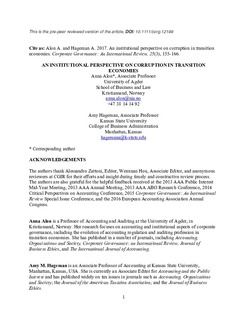| dc.contributor.author | Alon, Anna | |
| dc.contributor.author | Hageman, Amy | |
| dc.date.accessioned | 2018-03-06T10:20:50Z | |
| dc.date.available | 2018-03-06T10:20:50Z | |
| dc.date.created | 2017-09-28T15:05:00Z | |
| dc.date.issued | 2017 | |
| dc.identifier.citation | Alon, A. & Hageman, A. (2017). An institutional perspective on corruption in transition economies. Corporate governance: An International Review, 25(3), 155-166. doi: | nb_NO |
| dc.identifier.issn | 1467-8683 | |
| dc.identifier.uri | http://hdl.handle.net/11250/2488834 | |
| dc.description | Submitted version (preprint). | |
| dc.description | This is the pre-peer reviewed version of the following article: Alon, A. & Hageman, A. (2017). An institutional perspective on corruption in transition economies. Corporate governance: An International Review, 25(3), 155-166, which has been published in final form at https://doi.org/10.1111/corg.12199. This article may be used for non-commercial purposes in accordance with Wiley Terms and Conditions for Use of Self-Archived Versions. | |
| dc.description.abstract | Manuscript Type: Empirical
Research Question/Issue: Companies operating in transition economies encounter a broad range of potential challenges. In the area of tax, firms make direct tax payments but may also encounter unofficial tax costs in the form of bribery or extortion. We focus on institutional determinants, including formal rules, informal rules, and enforcement, to examine conditions under which firms are more likely to encounter these transactions. We operationalize formal rules as rule-based trust and informal rules as dispositional trust.
Research Findings/Insights: Based on a sample of over 5,000 firms representing 20 transition economies, we show that when rule-based trust is high, the presence of tax enforcement activities in the form of visits and inspections by tax officials does not change the relationship between rule-based trust and unofficial payments. However, when dispositional trust is low, unofficial payments are more likely if verification activities occur.
Theoretical/Academic Implications: We adopt a more holistic view and focus on the joint consideration of different institutional determinants and firm outcomes. In doing so, the article demonstrates the complexity of firms' tax environments where enforcement mechanisms can have unwelcome consequences, and, under certain conditions, create conditions for the persistence of corruption.
Practitioner/Policy Implications: This paper highlights the importance of the institutional landscape, especially considering the history of institutional voids in many transition economies. The results have implications for corporate governance and caution regulators and practitioners to consider institutional complexities when implementing reforms or establishing businesses in transition economies. | nb_NO |
| dc.language.iso | eng | nb_NO |
| dc.publisher | Wiley | nb_NO |
| dc.title | An institutional perspective on corruption in transition economies | nb_NO |
| dc.type | Journal article | nb_NO |
| dc.description.version | submittedVersion | nb_NO |
| dc.source.pagenumber | 155-166 | nb_NO |
| dc.source.volume | 25 | nb_NO |
| dc.source.journal | Corporate governance: An International Review | nb_NO |
| dc.source.issue | 3 | nb_NO |
| dc.identifier.doi | 10.1111/corg.12199 | |
| dc.identifier.cristin | 1499867 | |
